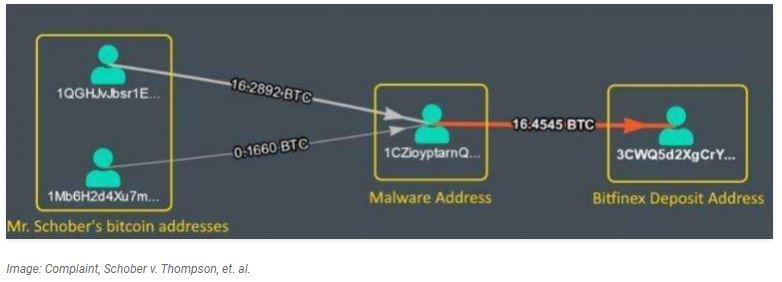Man Robbed of 16 Bitcoin Sues Young Thieves’ Parents

A man in the US has taken civil action against the parents of two young men in the UK for stealing 16 bitcoin (BTC) from him after the pair used clipboard-stealing malware to alter the destination of the crypto when the man tried to transfer it.
According to a civil order filed this year, in 2018 Colorado man Andrew Schober had 16.4 BTC stolen when he tried to move the digital asset from one account to another. When Schober realised the bitcoin never reached the intended account, he began to worry something had gone wrong.
After losing about 90 percent of his net wealth at the time, saved to finance a home and support his family, Schober spent over US$10,000 hiring a team of investigators to track down his lost crypto. On closer inspection of Schober’s computer, they found he had accidentally downloaded some malware after clicking a link posted on Reddit for a supposed cryptocurrency wallet application called “Electrum Atom”.
After months of investigation, the crypto was tracked to two young men in Britain who were minors at the time of the theft.
The first defendant had been found just hours after Schober’s bitcoin was stolen when he posted a message to GitHub asking for help accessing the private key corresponding to the public key of the bitcoin address used by the clipboard-stealing malware. The other defendant had the malware code that was bundled with the Electrum Atom application in his GitHub code library.
Beware Clipboard-Stealing Malware
The malware used to steal Schober’s bitcoin was bundled with a wallet program that was designed to wait for a user to copy in the lengthy wallet address. When an address is copied to the computer’s temporary clipboard, it gets swapped with another new address to which it gets sent.

Difficulty Retrieving Funds
After Schober tried to contact the young defendants’ parents for redress, there was no response. He stated that “losing that money has been financially and emotionally devastating. He [sic] might have thought he was playing a harmless joke, but it has had serious consequences for my life.”
After being met with continued silence from the parents for several months, Schober filed suit against both the young men and their parents in a Colorado court.
“These crimes can be monumentally difficult and expensive to track down,” said Mark Rasch, a former prosecutor with the US Justice Department who is now in private practice. “It’s designed to be difficult to do, but it’s also not designed to be impossible to do.”
Rasch said he was currently acting in several lawsuits involving young men who’ve been accused of stealing and laundering millions of dollars of cryptocurrency, specifically crimes involving SIM swapping.
A lot of these crimes are being committed by juveniles, and we don’t have a good juvenile justice system that’s well designed to both civilly and criminally go after kids.
Mark Rasch, attorney
It makes sense that some victims of cryptocurrency theft are spending serious money to track down perpetrators and sue them civilly.
In a related story from last year, Ledger users flagged a class-action lawsuit after having their personal information breached.






